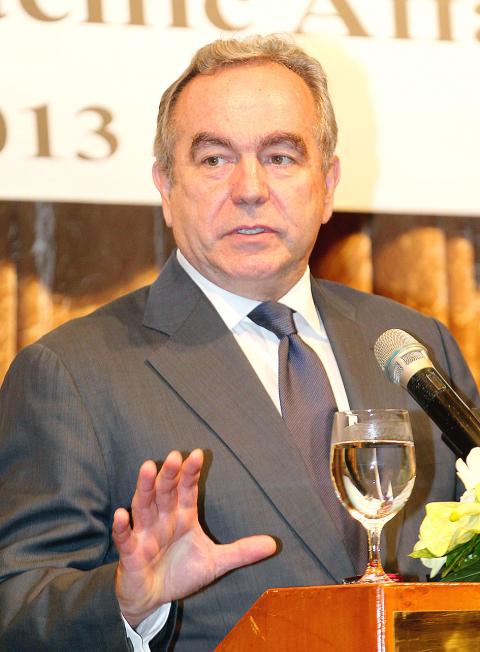|
Taiwan needs to diversify across
region: Campbell
By Shih Hsiu-chuan / Staff reporter

Former US assistant secretary of
state for East Asian and Pacific affairs Kurt Campbell delivers a keynote speech
at the Taiwan-US-Japan Trilateral Security Dialogue forum in Taipei yesterday.
Photo: CNA
While applauding the cross-strait
rapprochement of recent years under President Ma Ying-jeou (°¨^¤E) administration,
a former US official yesterday reminded Taiwan that its best strategic interests
lie in deeper economic relationships with other countries in Asia.
¡§You have done a remarkable job in China, but the degree of diversification is
in your best strategic interests,¡¨ Kurt Campbell, who served as US assistant
secretary of state for East Asian and Pacific affairs from 2009 to February this
year, told at a luncheon in Taipei.
Whoever is in power or in the opposition, it is important for them to recognize
that it is in the interests of Taiwan to have a deeper economic relationship
with other countries in Asia, he said.
Campbell was answering a question from Joanne Chang (¸Ê¥üµY), a research fellow at
Academia Sinica¡¦s Institute of European and American Studies, who asked what
Taiwan needs to do to establish its readiness to meet the standards of the
emerging US-led Trans Pacific Partnership (TPP) framework.
The TPP offers enormous possibilities for a number of countries in the region,
but ¡§there has to be political ambition, and that has to extend beyond one
political polity¡¨ for a country to join the TPP, he said.
¡§Every country I go to, whether is Indonesia, or Thailand, or the Philippines,
they all say the same thing: I would like to join the TPP. Can you give us a
special dispensation, so that we can get in like a junior membership or
something? It¡¦s not gonna be possible,¡¨ he said.
As an example, Campbell said the steps taken by Vietnam to liberalize its
economy in just a year and a half were recognition of its desire to play on a
global stage.
He recalled his experience in negotiating over trade barriers hampering the
resumption of the US-Taiwan Trade and Investment Framework Agreement (TIFA).
¡§One of the hardest I have to deal with in the last couple of years is TIFA.
It¡¦s really hard, really, really hard,¡¨ Campbell said.
In response to a question about the role of China in US arms sales to Taiwan,
Campbell said the US and Taiwan need to engage in ¡§more unofficial dialogues and
integration.¡¨
¡§I can¡¦t disagree with you that the nature of both the challenges we face were
remarkable investments that China has made over periods of time and some
limitations in Taiwan¡¦s defense budget made these issues critical,¡¨ he said.
It was the first visit to Taiwan since Campbell, an architect of US President
Barack Obama¡¦s pivot or rebalancing toward the Asia policy, left the office. He
is now chairman and chief executive of The Asia Group, LLC, and on the board of
the Center for a New American Security.
At the luncheon at a forum on US-Taiwan-Japan Trilateral Security Dialogue, a
track 1.5 channel among the three countries, Campbell delivered a speech on
security dynamics in Northeast Asia and the implications for Taiwan.
Over the last couple of years, the US-China relationship has been relatively
stable, the cross-strait relationship is probably at an all-time high and the
unofficial relationship between Washington and Taipei is one of the strongest in
decades, Campbell said.
¡§The three-way relationship has a degree of stability. That is unique over the
course of 30 years. Taiwan deserves remarkable credits for managing these
complex and myriad relationships going forward,¡¨ he added.
This story has been updated with addtional information since it was first
published.
|
![]()
![]()
![]()